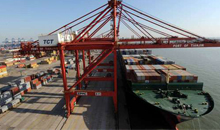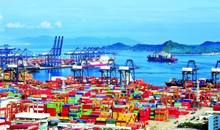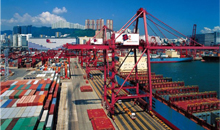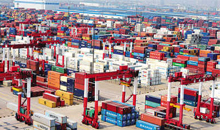
China’s exports fell in July on weak demand and global uncertainty as headwinds continued to buffet the world’s second-largest economy.
China’s General Administration of Customs said Monday that exports fell 4.4% in July year-over-year in dollar terms after a 4.8% decline in June. Last month’s results were weaker than a median 3.6% decline forecast by 17 economists polled by The Wall Street Journal.
July imports fell by a greater-than-expected 12.5% from a year earlier, raising concerns over weak domestic demand. This compared with an 8.4% fall in June, the customs agency said. China’s trade surplus widened more than expected in July to $52.31 billion from $48.11 billion the previous month.
“Exports and imports were both quite soft,” said Macquarie Group Ltd. economist Larry Hu. “The trade surplus remains elevated at over $50 billion, so China’s not going to depreciate the currency a lot ahead of the G-20 meeting next month,” he added.
China hosts the Group of 20 major economies summit in the eastern city of Hangzhou in early September. Economists said Beijing is likely to keep its monetary policy and currency relatively stable until then to avoid drawing unwanted attention to itself ahead of the meeting. China and other countries have been accused of keeping their currencies artificially weak in the past to favor exporters.
The yuan depreciated 0.3% against the dollar in July. On Sunday, the central bank reported that foreign-exchange reserves fell by $4.1 billion in July to $3.201 trillion after rising by $13.4 billion in June.
July’s drop in exports and even larger drop in imports come as Beijing tries to stabilize growth by frontloading infrastructure projects, cutting red tape and maintaining a loose monetary policy. The economy grew at a better-than-expected 6.7% rate in the second quarter, matching its first-quarter level, which was the slowest quarterly pace since the global financial crisis.
But Beijing faces a raft of weak data. China’s bad-loan rate at commercial banks edged up in the second quarter to its highest level since 2009. Fixed-asset investment decelerated in June. And the official purchasing managers index slipped into negative territory in July for the first time in five months.
Companies in China say they are feeling the impact of weaker demand and rising labor costs as the country’s population ages. Last month, the International Monetary Fund cut its global growth forecast for the third time this year on concerns that Britain’s decision to leave the European Union could undercut trade and investment.
Zhi Lie He Household Factory Co., a furniture exporter in the northeast coastal city of Qingdao, said export orders have fallen 20% this year compared with 2015 levels. And while a weaker yuan against the dollar has helped its business at the margin, it isn’t enough to counter falling U.S. and European orders and growing difficulty securing bank loans, the company said.
“Labor costs are going up and fewer clients are buying from us,” said Huang Haiyan, the company’s general manager, adding that she expects to lay off 10% of their 100-person workforce in the next few months. “The business outlook really doesn’t look very good,” she said.
Exports, once a major growth driver, have been a net drag on output over the past year. This comes as real-estate sales and infrastructure spending start to decelerate. According to a survey of 17 economists by The Wall Street Journal, Chinese business activities from industrial production to investment are likely to slow further in the second half of 2016 without a fresh round of stimulus.
China’s large July trade surplus could fuel more criticism from Republican presidential candidate Donald Trump that China is unfairly manipulating its currency, said IG Markets Ltd. analyst Angus Nicholson. China has come under growing pressure in recent months over its steel exports, which companies and labor groups say are sold at prices below the cost of production. China has vowed to cut excess capacity, so far with limited results.
“I definitely think we could see concern over the surplus,” he said. “We have a long way to go before we really see a decline in China’s overcapacity.”
Even as China props up growth, China is trying to reduce excess capacity in steel and other industries and retool the economy away from low-end manufacturing toward consumption and services as the nation’s land and labor costs rise.
—Liyan Qi contributed to this article.
(Source: wsj.com Author: Mark Magnier)



























 沪公网安备31010402003309号
沪公网安备31010402003309号